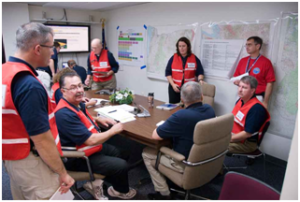Purpose
Major Emergency Management Initial Response course will be presented by a professional OIM who handles such operations and procedures. Purpose is to let the delegates undergo various simulated emergencies and learn command, control and communications in an emergency situation handling while maintaining calm.
The aim of the MEMIR Training is to equip personnel with formal training in command, control, communications and stress-related factors in the management of major emergencies. In addition, this programme also provides initial emergency management training for personnel who are undertaking a training and competence programme to progress to the role of an emergency response manager.
The objectives of the MEMIR Training are that delegates will be able to:
a) Understand the key factors of preparing for, responding to, and maintaining control throughout the development or escalation of an emergency situation.
b) Learn how to manage communication, emergency-related information and put into place predetermined plans at the point when the emergency alarm has been raised, to the point when the emergency manager is assured that the emergency is over.
c) Understand how stress can impact on individuals and team performance during emergencies.
d) Have the opportunity to role-play as the emergency manager in a minimum of two specific types of emergency scenarios. This is a key element of the training programme, and is backed up by constructive feedback from the course instructional team.
Target Audience
OIM, Barge Master, Health and safety leaders and those who are members of the on board emergency response team.
Course Content
- Review, manage and assess the information available in an emergency situation in a timely manner.
- Establish priorities and take effective action.
- Implement predetermined emergency plans and procedures in the context of the current emergency.
- Efficiently communicate information and instructions.
- Keeping appropriate agencies informed through the support Emergency Response Team.
- Monitor and control resources.
- Evaluate progress and communicate changes in plans and priorities.
- Effectively delegate authority and manage individuals and teams.
- Recognise and deal with stress in themselves and others
Theory Sessions
- Emergency Management Philosophy
- Information Management, Roles and Responsibilities
- Emergency Response Procedures
- Communications
- Time Out – Team Brief
- Stress Identification & Management
- Abandonment
- Options on various resources
- Communications with Agencies
- Escape Routes
- Shutdown Facilities
- Decision Making
- Assertiveness
- Information Management
Practical Sessions (Simulations)
- Condensate / Oil Spill
- Accommodation /Gallery or Machinery Space Fire
- Helicopter Crash on Deck
- Gas Detection / Release
- Tanker Collision
- Sea Surface Fire
- Structural Damage
- Approaching Rogue Vessel
- Loss of Stability
- Evacuation
- Abandonment
- Injured Personnel
- Missing Personnel or Man Overboard
- Stressed Personnel (individual ineffectiveness or mass panic)
- Rapidly developing situation leading to information overload
- Loss of Mooring (where applicable)
Course Fee INR Duration Course Timing Date Commence Remarks
MEMIR 40,000 4 days 10:00-18:00 On Demand Min 4, Max 6 Delegates

